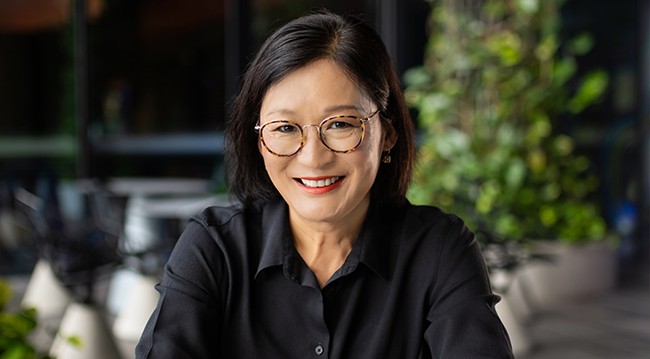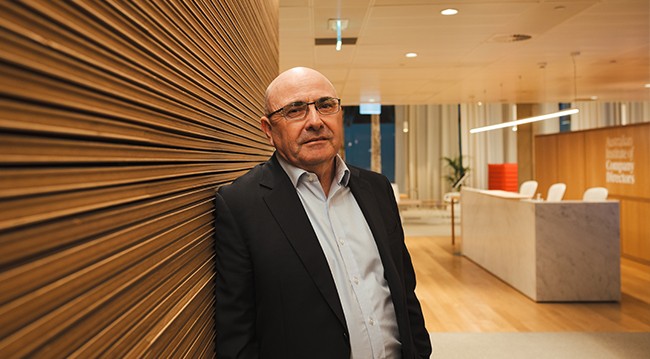Ever weighed up the career-boosting merits of an MBA versus the Company Directors Course? Now imagine you could combine the two. Make sense? The University of South Australia thinks so.
In a first among Australia’s wide field of business schools, the University of South Australia (UniSA) has partnered with the AICD to embed the Company Directors Course as a capstone in its Master of Business Administration. Professor Lan Snell MAICD, Dean of Programs (Postgraduate) at UniSA Business, says the integration of the national governance qualification is a core differentiator for UniSA’s MBA, the only one to do so among some 40 MBA programs offered in Australia.
Combining the two, she says, is “a much stronger value proposition”. “Typically, a student will take 18 months to complete an MBA and then, in two to five years, they’ll be thinking about future-proofing themselves further, with that next step being perhaps a board experience,” she says. “But to do that, they’ll need to take the Company Directors Course. So, by coupling it with an MBA, you accelerate that journey, future- proofing yourself from the get-go. That’s an immediate benefit.”

Prof Lan Snell MAICD, UniSA Business
The combined qualification was the clincher for graduate Finbar Mills GAICD when choosing his MBA program, one of more than 350 students to have so far graduated with the governance capstone since its integration into UniSA’s MBA in 2016.
“I could see how much of an impact it would make to where I want to take my career,” says Mills, a senior bid manager with leading global engineering and professional services firm WSP.
With an eye on “pushing through to the next level” as an executive before ultimately branching into directorships, Mills says the program has put him on track, deepening his understanding of “the whole ecosystem of business” and standards of excellence to which business leaders should aspire.
“It’s also really built my confidence,” says Mills, who was invited last year to join his first board as a non-executive director, an indication the program is already bearing fruit. “Having a better grasp on all points of view — across strategy, regulation, finance — I feel far more confident when sitting around decision-making tables in identifying the things we need to consider, speaking up and backing myself. It’s a huge thing.”
A winning combination
Australian institutions, in which an estimated 20,000 students are currently undertaking an MBA, have some of the highest-ranked MBAs in the world. UniSA, which has offered an MBA program since 1980, is among them, with its business school in the top one per cent of 25,000 universities worldwide to be accredited by leading global body the European Foundation for Management Development.
Peter Lock GAICD, CEO of member- owned banking organisation Heritage and People’s Choice and a UniSA alumnus, believes combining the MBA’s technical expertise with the embedded governance qualification makes graduates more attractive to prospective employers.
“When you’re employing MBA graduates, you’re doing so with a longer view that these people will be in significant roles and will have to understand the governance that comes with organisations,” says Lock. “You need your executives to understand the responsibilities of a board, which are quite different from executive responsibilities. That’s important for when they are presenting to boards and in understanding the questions that come from boards. The Company Directors Course embeds compliance, governance and practical thinking — all those things that are required not only of senior managers, but as you move into C-suite roles.”
Kate Sharrad GAICD, CEO of cancer treatment accelerator CureCell, has no doubt the program has “changed the shape of the conversations” she has with her organisation’s board. “I’ve had direct feedback from my board that they’ve seen the development of my thinking and the way I approach things since I’ve been doing my MBA,” she says. “I certainly feel calmer, wiser perhaps, when I’m confronted with situations where there’s a lot of grey without a clear path forward. It’s surprising how much it has actually helped me ask the right questions and trust my judgement.”
Sharrad says her network of like- minded professionals “exploded” during her studies and that the combined formal qualification was influential in her recent appointment to the board of another NFP, giving her a runway towards her goal of taking on an executive role in the commercial sector and building a portfolio of non- profit directorships.
Snell says UniSA’s MBA goes well beyond basic business competence to provide the leadership capabilities needed to adapt to the dynamic geopolitical, technical, social and ethical challenges of the future business landscape. She adds that the Company Directors Course is more than just “a deep dive on compliance and regulation”.
“When we talk about what governance means, many people look at a baseline compliance regulatory approach, and that is absolutely fundamental,” she says. “But equally, so is that we need to be adaptable, ambidextrous, experimental in our thinking, which means we can be compliant, but also innovative enough to seek growth. The MBA and Company Directors Course together make for a very complementary offering. Education can be fundamentally the most transformative thing you can do.”

Peter Lock GAICD, CEO Heritage and People's Choice
Latest news
Already a member?
Login to view this content


